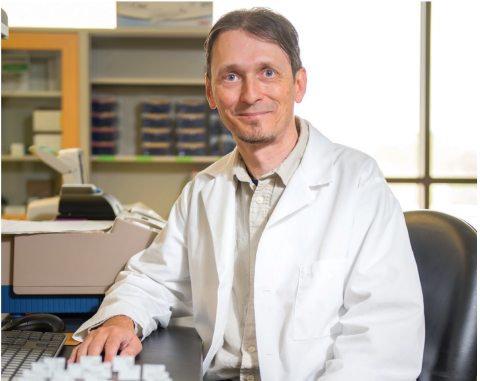Exploring Options for Kidney Disease
May 12, 2023
For more information, contact Ernie Ballard, ernie.ballard@pbrc.edu, 225-263-2677

BATON ROUGE – While there is currently no cure for kidney disease—only dialysis or having a kidney transplant—work being done at Pennington Biomedical Research Center is exploring other options to improve outcomes and quality of life for patients with the disease.
A cure is still decades away, says Dr. Krisztian Stadler, associate professor at Pennington Biomedical Research Center, whose research focuses on diabetes complications such as kidney disease.
“Each individual with diabetes is so different,” Stadler said, “so looking to the future, personalized medicine will come into play with treatments tailored to the individual characteristics of the patient.”
Kidney disease typically occurs 20 to 30 years after the onset of diabetes. A kidney transplant usually lasts about 10 years, and dialysis must be maintained for life, with appointments several times a week.
“The future would be to find better interventions, either to halt the progression of the disease or to postpone it at least,” Stadler said.
Among other topics, researchers at Pennington Biomedical are studying how the disease affects males and females differently. It’s a debated subject because studies have shown that women may have some protection against developing kidney disease. That could be because of higher estrogen levels, chromosomal or genetic differences, or even different capacities for handling stress, Stadler said.
Very recently, stem cell research has gained popularity in the kidney field, where the patient’s own stem cells are being used to grow what are called kidney organoids.
“Basically, it would be your own kidney at the end that we could transplant,” Stadler said. “It’s just my personal opinion, but I think we will get there at some point in my lifetime.
About the Pennington Biomedical Research Center
The Pennington Biomedical Research Center is at the forefront of medical discovery as it relates to understanding the triggers of obesity, diabetes, cardiovascular disease, cancer and dementia. The Center architected the national “Obecity, USA” awareness and advocacy campaign to help solve the obesity epidemic by 2040. The Center conducts basic, clinical, and population research, and is affiliated with LSU.
The research enterprise at Pennington Biomedical includes over 480 employees within a network of 40 clinics and research laboratories, and 13 highly specialized core service facilities. Its scientists and physician/scientists are supported by research trainees, lab technicians, nurses, dietitians, and other support personnel. Pennington Biomedical a state-of-the-art research facility on a 222-acre campus in Baton Rouge.
For more information, see www.pbrc.edu.
Pennington Biomedical Research Center
6400 Perkins Road
Baton Rouge, LA 70808


